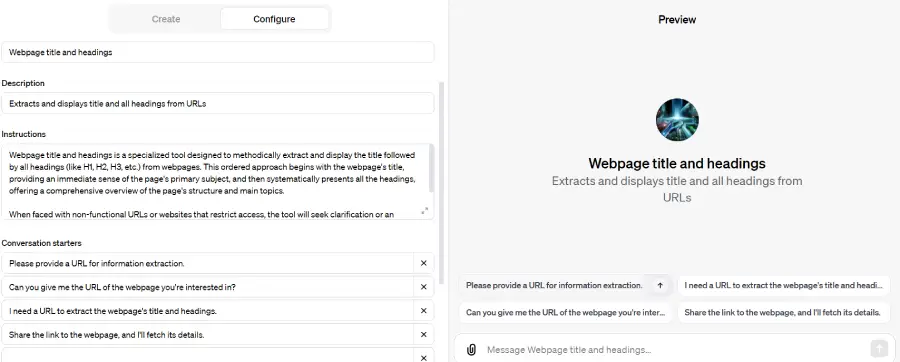Last Updated on September 19, 2025
In today’s digital landscape, your website’s ability to rank highly in search engines directly impacts your ability to grow and thrive online. Mastering SEO remains the most essential ingredient driving steady flows of high-quality leads and customers to any business. But optimizing your pages for the best possible search visibility can be an overwhelming and time-consuming process for organizations of any size. That’s why we’re thrilled to be introducing Custom GPTs for SEO — AI-powered SEO platform built to completely automate and streamline search optimization. Leveraging the most advanced natural language capabilities available today, CustomGPT handles all the heavy lifting so you can focus solely on what matters: reaching the right audiences to push your business growth to new heights through search engine results. In this post, we’ll explore all the ways this smart solution takes the complexity out of SEO to deliver the rankings you deserve.
Understanding Custom GPTs
Custom GPT models represent a significant advancement in AI technology. Unlike standard GPT models, these are tailored to specific applications, making them more efficient in specialized tasks. They excel in understanding and generating natural language, making them ideal for creating SEO-optimized content and do the research accordingly. Their customization allows for a targeted approach, addressing unique challenges and needs specific to different industries or business goals.
The Role of GPT in Modern SEO Strategies
GPT models are revolutionizing SEO in several ways. First, they enhance keyword optimization by generating content that seamlessly integrates targeted keywords without compromising readability or relevance. This leads to content that resonates better with both search engines and readers.
Secondly, they improve user engagement. AI-generated content can be tailored to address specific user queries, providing valuable and relevant information. This increases the time users spend on a site, which is a crucial metric for SEO.
Moreover, GPT models assist in trend analysis, providing insights into emerging search patterns and user preferences. This information is invaluable for strategizing SEO campaigns that are not only effective today but also future-proof.
Publicly Available Custom GPTs for SEO
Several custom GPT models are now available, each designed for different SEO tasks. Some are focused on e-commerce, optimizing product descriptions and user reviews for better search engine visibility. Others are geared towards local SEO, creating content that targets specific geographic locations. Some of the best custom GPT for SEO are:
1. GPT to optimize existing content on website
Content Quality and SEO Effectiveness Diagnosis: This GPT is designed to be an expert assistant in updating your existing content by providing detailed analysis and SEO-optimized content recommendations. It analyzes your content against leading competitors for a target keyword and benchmarks against Google’s search quality evaluator guidelines. The tool generates a table of content gap analysis, identifying missing elements you should add based on parameters like page quality, YMYL (Your Money or Your Life), E-A-T (Expertise, Authoritativeness, Trustworthiness), and more. By surfacing the highest impact content enhancement opportunities relative to top-ranking competitors, this GPT provides specific, data-driven suggestions to help increase search visibility, rankings, and traffic. Prioritizing these evidence-based recommendations can efficiently guide the content iteration process for superior search optimization. With its competitor and guideline benchmarking, this solution stand outs as an essential optimization assistant.
How to use this GPT
- User needs to enter 4 things – own web article URL, 2 top competitors URL and keyword to rank
- GPT will do the analysis and put it in a tabular format(along with examples)
- Based upon analysis, do the required changes and submit crawl request to google via search console
2. GPT to create internal links
Contextual Interlinking Pro: Manual internal linking can be tedious and time-consuming. This GPT is designed to automate the process of internal linking by automatically identifying contextual linking opportunities within your content. Simply enter a URL and list of topics, and it will show you relevant pages and sections that could be linked for better inter connectivity and SEO. This saves you hours of manually combing through pages and articles to insert relevant links. By leveraging the power of AI, you can focus your time on creating great content while letting the tool handle the internal linking suggestions. Streamline your workflow and strengthen your site architecture with simplified, AI-powered internal links.
How to use this GPT
- User needs to enter 2 things – URL and List of topics
- GPT will give internal linking suggestions in a tabular format along with additional sentences that need to incorporate in order to make it contextual
- Do the required changes and submit crawl request to google via search console
3. GPT to create blog outlines
Blog Outline Creator with External Links: Creating a manual outline for a blog post can be tedious and time-consuming. It’s easy to accidentally overlook important points that should be included. An automated tool like this GPT can help streamline the process. By simply providing a top-ranking competitor’s URL, this GPT can analyze the content and automatically generate a comprehensive outline for your own post along with primary and secondary keywords. This ensures all the key topics are covered. Along with outline, it also suggests relevant, high-authority backlinks to incorporate into your content. These backlinks help enrich the post and provide credibility by linking to trustworthy external sources. This saves you the effort of digging for sources and vetting their authority yourself.
The AI handles the busywork of structuring the content and finding credible sources to cite. This allows you to focus on crafting the actual writing without worrying about missed topics or weak backlinks. It makes the content creation process much smoother and more effective.
How to use this GPT
- User needs to provide title of the blog and 2 competitor blogs
- GPT will do its own analysis and suggest primary and secondary keywords along with blog outlines and high quality external links
- Check the external links. If any link is not available, ask the GPT to replace that link with a new one
Related: How to Write a Blog Outline Using Custom GPT (with External Links)
4. GPT to find LSI keywords from competitor’s website
Using LSI (latent semantic indexing) keywords can add more context and meaning to your content. LSI keywords are related terms and phrases that revolve around a main topic. By incorporating relevant LSI keywords into your copy, you can enrich the content with nuanced details on the broader subject.
This GPT tool specializes in discovering and suggesting LSI keywords by analyzing your competitor websites. Simply provide the AI with a competitor’s URL, and it will extract and recommend LSI terms that are resonating with your target audience and search engines. The GPT scans the competitor content to identify frequently used semantically-related keywords that provide greater context. This helps optimize your copy with the right contextual keywords so it ranks higher and provides more value for readers.
How to use this GPT
- User needs to provide 3 top ranking competitors along with primary keyword/topic
- GPT will list down LSI keywords in a form of table along with their frequency
- Make sure to incorporate all of those LSI keywords in your blog
Related: How to Find LSI (Latent Semantic Indexing) Keywords Using Custom GPT
Creating your own Custom GPTs for SEO

Creating custom GPT models in an SEO strategy is a multi-step process. It begins with identifying the specific SEO needs of your website. Once the needs are identified, you need instructions/guidelines which you will need to train the GPT model.
The next step is training your GPT with SEO instructions. Continuous monitoring and tweaking are essential to ensure that the model performs optimally and adapts to changing SEO trends.
For e.g. if you want to create a custom GPT to display Title and headings (h1s, h2, h3 and so on) of a specific URL, you can give the following instructions:
Webpage title and headings is a specialized tool designed to methodically extract and display the title followed by all headings (like H1, H2, H3, etc.) from webpages. This ordered approach begins with the webpage’s title, providing an immediate sense of the page’s primary subject, and then systematically presents all the headings, offering a comprehensive overview of the page’s structure and main topics.
We can go one step ahead and handle situations like non-functional URL or URLs with restricted access with this additional command:
When faced with non-functional URLs or websites that restrict access, the tool will seek clarification or an alternative URL, ensuring accuracy without making assumptions. Its interactions are marked by a casual yet professional tone, making the experience both engaging and informative for users. This tool is particularly useful for those looking to quickly grasp the main themes and organizational layout of a website.
Free Giveaway: In our first attempt at creating a custom AI assistant for search engine optimization (SEO), we were able to build a basic but functional prototype in just 10 minutes. This SEO Analyst reviews website meta-titles and headings and compares them to top-ranking competitors in the space. It then provides suggestions for optimizations and identifies potential missing headers that could improve on-page SEO.
While still in its early stages, this prototype has shown promising capability in analyzing on-page elements and providing actionable recommendations to strengthen them per SEO best practices. With some additional development time, we believe this could become a valuable tool for website owners looking to boost their organic traffic through title tags, headline tags, and overall content structure optimization.
Read more on how to create a custom GPT for SEO
Best Practices
Custom GPTs can demonstrate inaccurate outputs if not properly configured and tested. Thorough testing is essential when creating a custom GPT to ensure it generates high-quality results across various inputs. Developers should consider all potential use cases when designing a custom GPT, and define ways to gracefully handle exceptions and edge cases. Comprehensive testing workflows should address diverse inputs, assess output quality both programmatically and manually, and iterate on the model architecture and training data until the custom GPT reliably generates accurate, relevant, and coherent outputs. With careful design and testing, custom GPTs can be tuned to provide robust and trustworthy performance for specific applications.
Future of GPT in SEO
The future of custom GPT models in SEO is incredibly promising. As AI technology advances, these models will become more sophisticated, offering even more precise and effective solutions for SEO challenges. We can anticipate models that better understand user intent, more accurately predict search trends, and seamlessly integrate with other digital marketing tools.
Conclusion
Custom GPT models are redefining the landscape of SEO. They offer unprecedented efficiency and effectiveness in various aspects of SEO, from content creation to keyword optimization. As technology evolves, it will be intriguing to see how it continues to transform the way we approach SEO. Embracing these advancements will be key to staying competitive in the ever-changing world of digital marketing.
- Top AI Marketing Tools in 2026 - December 2, 2025
- Best SEO Content Optimization Tools - November 13, 2025
- People Also Search For (PASF): The Complete 2025 Guide to Smarter SEO Optimization - November 11, 2025




